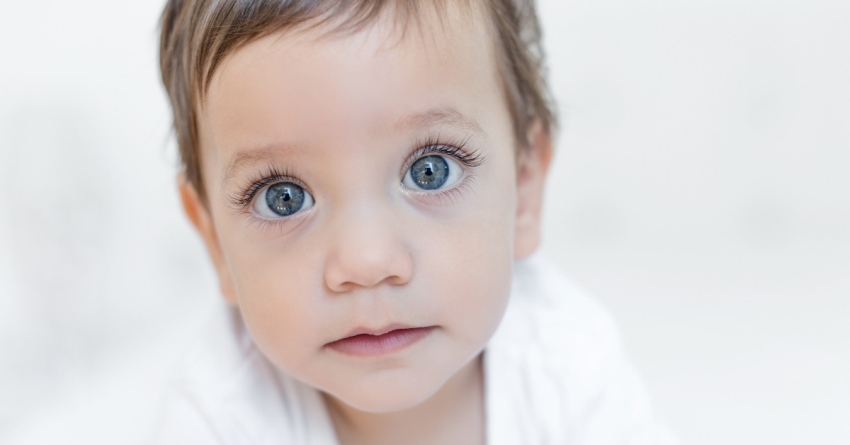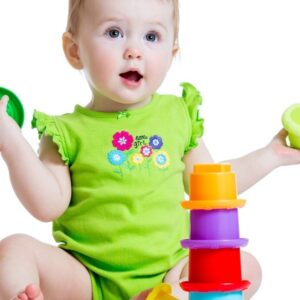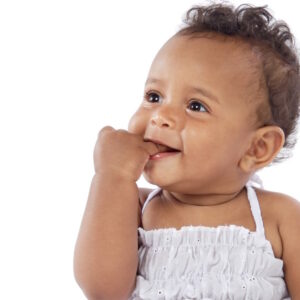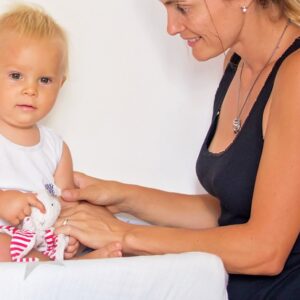A happy, smiling, laughing baby is something easily taken for granted. That’s how babies are, right (when they’re not tired, hungry, in pain,…)?
But what if your baby is not laughing? What does it mean? Is the baby unhappy, is it a personality thing, or a developmental issue of some kind?
The mom in this Q&A has a 10-month-old baby that won’t laugh.
Mom’s Question:
My baby is almost 10 months old, and I can count on one hand how many times she has laughed out loud.
Why won’t my baby laugh????? I am very worried that something is wrong with her. Shouldn’t a baby her age laugh?
Baby Is Not Laughing: Possible Reasons and What to Do
It is tough when you notice major differences in your own child’s behavior compared to others.
One common language milestone is actually laughing out loud, which develops at around 3 to 6 months of age.
However, if your girl is smiling, babbling, and communicating, she will likely be fine, especially since she has laughed out loud at least a few times.
How does she react if you tickle her?
Let’s take a look at how verbal skills, including laughing, typically develop in babies, as well as some possible reasons why a baby might not be laughing and what to do.
When do babies learn to laugh and smile?
One of the main areas of learning and development in children is language. There are two categories: being able to understand language and being able to express one’s self through language. Laughing is part of the expressive language category.
During a baby’s first two months, they start communicating simple wants and needs by crying when hungry or upset or yawning when sleepy. By the time they reach two months old, they start to smile. At three months old, they begin to vocalize by cooing.
Between three to six months of age, infants start to babble and laugh. By 10 months old, they can usually string together ”dada” and ”mama” to call on their parents. Finally, as they turn one year old, they begin to speak a few simple words.
What makes babies laugh?
Laughter in babies is an involuntary action triggered by areas of the brain linked to happiness and pleasure. Psychologists have observed that, amazingly, infants know some simple rules and concepts about their environment, like the general shape of a human’s face or how people normally behave. Something unusual, such as when parents make silly faces or sounds, amuses babies and makes them laugh.
There isn’t much information on what else might make a baby laugh, but one study noted that those who are less than one year old are sensitive to their parent’s emotions. It’s possible that these babies laugh in response to the positive emotions their parents project toward them.
In adults, genuine laughter usually comes from happy experiences, which may be shared by two or more people together. Research points out that humans may have learned how to laugh, even at a young age, when they feel comfortable with their parents and caregivers. This, in turn, leads to healthy attachments and positive relationships with them.
Possible reasons why babies do not laugh?
Autism Spectrum Disorder (ASD)
According to the Centers for Disease Control and Prevention (CDC), babies should be able to smile and laugh with their caregiver by the time they turn 9 months old. Otherwise, there might be a developmental delay; your baby might need to be assessed by a pediatrician for autism spectrum disorder.
Autism spectrum disorder (ASD) is a neurodevelopmental condition that affects about 1.7% of kids in the United States. A doctor may need to screen a child for ASD when they don’t reach certain developmental milestones at the right time.
For curious parents, here is a quick summary of important developmental milestones for 9-month-old babies. By this age, your child is most likely to:
- Experiment with different sounds.
- Understand the word “no”.
- Sit comfortably, start crawling, and pull on furniture to stand up.
- Copy some of your actions or movements.
- Explore their surroundings by grasping small objects, sometimes placing them in their mouth.
- Play “peek-a-boo” with you.
- Stick with familiar people, and avoid or get upset with strangers.
- Choose a favorite toy.
You can read more about 9-month-old development milestones here.
Hearing loss
Hearing loss can happen when there is a problem in the development of any part of the ear, making it difficult for sounds to be received or processed properly by the brain.
The CDC has stated that symptoms of hearing loss aren’t the same for all children. The most common signs include not reacting to some sounds or a delay in speaking basic words such as “mama”. Not being able to develop language skills further (including laughing) may be a sign of hearing loss.
Most infants are screened for hearing before they are discharged from the hospital, but a “pass” does not guarantee that your child won’t develop hearing loss beyond their first few days of life.
Here are a few signs of hearing loss related to 9-month-old babies, listed by the American Academy of Pediatrics:
- Your baby only notices you when you are in their line of sight.
- Your baby doesn’t respond when you call their name.
- Your baby reacts only to certain sounds.
- Your baby might find it difficult to keep their head straight or sit properly (some problems in balance can also be related to hearing loss).
- Instead of exploring vowel sounds, your baby prefers to concentrate on vibrating sounds, like gargling.
- Speaking single words like “mama” and “dada”, which can develop at this age, might not start until they’re past one year old.
Bonding (secure attachment) with parents
Infants with a strong bond or attachment with their parents learn how to control or manage their emotions much better than babies who don’t have secure emotional attachments. This healthy communication includes being able to understand and express their emotions.
Even before babies learn gestures, researchers noticed they already know how to respond by smiling and laughing.
Having an incomplete attachment with you, their parent, might be a reason why your child still hasn’t gotten used to laughing on their own.
How to stimulate laughing in a 10-month-old Baby
Before jumping to conclusions, let’s try several methods that could help your baby laugh more.
More talk and interaction
Parents who talk more and use a lot of gestures while speaking to their babies often can help develop their language skills, including laughing. So talk more, and laugh more with your baby!
Use more words
Don’t stick with the usual baby talk. Add some extra fancy words every now and then. Researchers also noticed that a richer vocabulary that is addressed straight to the baby (and not only overheard through adult conversations) helps them improve their language skills.
Try to make them laugh
One simple way is to try to make your baby laugh. Set aside time for this and make sure your child is not hungry, sleepy, or irritable. Try to make them laugh by doing funny baby gestures and movements – babies are triggered by unexpected, unusual things, like weird facial expressions.
What To Do Next When Your Baby is Not laughing?
If none of the tips above work, and you are worried about underlying conditions like hearing loss and ASD, bringing your child to a developmental pediatrician is the best option. They are specialists in children’s behavior and will most likely do a thorough examination and offer advice on what steps you may take next.
Here are two other Q&As about babies who are not laughing. Maybe the discussions there can be of help to you too.
Warm wishes,
Paula
Research References
- Laughing Matters: Infant Humor in the Context of Parental Affect
- Laughing Matters–and Helps to Explain How Babies Bond – Scientific American
- Talking to children matters: Early language experience strengthens processing and builds vocabulary
- Hearing Loss in Children – HealthyChildren.org

Paula Dennholt founded Easy Baby Life in 2006 and has been a passionate parenting and pregnancy writer since then. Her parenting approach and writing are based on studies in cognitive-behavioral models and therapy for children and her experience as a mother and stepmother. Life as a parent has convinced her of how crucial it is to put relationships before rules. She strongly believes in positive parenting and a science-based approach.
Paula cooperates with a team of pediatricians who assist in reviewing and writing articles.







